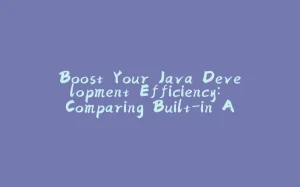As a Java development service provider, TatvaSoft of India has the expertise in different Java technologies, including J2SE, J2EE, JavaFX, J2ME and database techs like MySQL and Oracle and of course Java Applets as well. The company’s dedicated Java developers convert the ideas and objectives of clients into apps by providing exceptional services that meet client expectation. The company adheres strictly to processes and standards defined by the SEI under CMMi Maturity Level 3, ensuring clients avail the best quality apps within the time stipulated and within their budget.
WHAT ARE JAVA APPLETS?
Java Applets are small internet-based programs written in Java that could be downloaded by any computer. An applet is also is able to run in HTML. The applet usually is embedded in an HTML page on a website and could be executed from within a browser. It runs in a web browser and could be a thoroughly functional Java app since it has the whole Java API at its disposal.
Java applets weren’t introduced when Java came to be. These evolved after a few years and only by the year 1995, final and working Java applets versions were released. The apps initially were basic, but developers and experts alike were quick to notice the applets’ potential. Over time, more applets with extensive apps came to the fore.
DIFFERENCES BETWEEN AN APPLET AND STANDALONE JAVA WEB APPS
There are some critical differences between an apple and a standalone Java apps, which include the following:
- An applet is a Java class which extends the java.applet.Applet class
- Applets are designed to be embedded within the HMTL page
- A main() method isn’t invoked on an applet, an applet class won’t define main ().
- When a user looks at an HTML page that has an applet, the applet code is downloaded to the machine of the user
- A JVM is needed to view an applet. The JVM either could be a plug-in of the web browser or a different runtime environment
- The JVM on the machine of the user creates an instance of applet class and invokes different methods during the lifetime of the applet
JAVA APPLETS DEVELOPMENT AND THE BENEFITS
-
It’s simple to make it work on Microsoft Windows, Linux and OS X, to make it cross-platform. They are supported by most web browsers.
-
Most web browsers cache applets so will be fast to load when returning to a web page. Also, applets get better with use. After running a first applet, the JVM already is running and begins quickly.
-
The same applet could work on ‘all’, installed Java versions at the same time, instead of just the latest plug-in version only. Nevertheless, if an applet needs a later version of the JRE or the Java Runtime Environment, the client would be forced
to wait during a big download. -
It could move the work from serve to client, making more scalable web solutions with the number of clients and/or users.
-
It naturally supports the changing user state, like figure positions on the chessboard.
-
If a standalone program, such as Google Earth for instance talks to a web browser, the server normally requires to support all previous versions for user that have not kept the client software updated. In contrast, a browser that is properly configured loads the latest applet version, thus no need to support legacy versions.
-
Developers could develop and debug an applet simply by making a main routine and calling in it on () and begin () on the applet, so enabling development in their favorite Java SE development environment or with Java web development frameworks. All one should do after that is to re-test the applet in the AppletViewer program or a web browser to make sure that it adheres to security restrictions.
-
An untrusted applet doesn’t have access to the local machine and could only access a server it came from. This makes the applet much safer to run compared to a standalone executable one that it could replace. Nonetheless, a signed applet could have full access to the machine that it runs on if the user agrees.
-
Java applets are fast and could even have the same performance to a native installed software.
Different Java solutions, such as developing Java applets help organizations realize the full potential of the framework. Java is one of the most preferred technology and has a global standard for implementing each and every kind of apps, like web based, client-server, and cloud and enterprise system.
原文链接:Java Applet Development Services for Extreme Performance and Scalability




























暂无评论内容